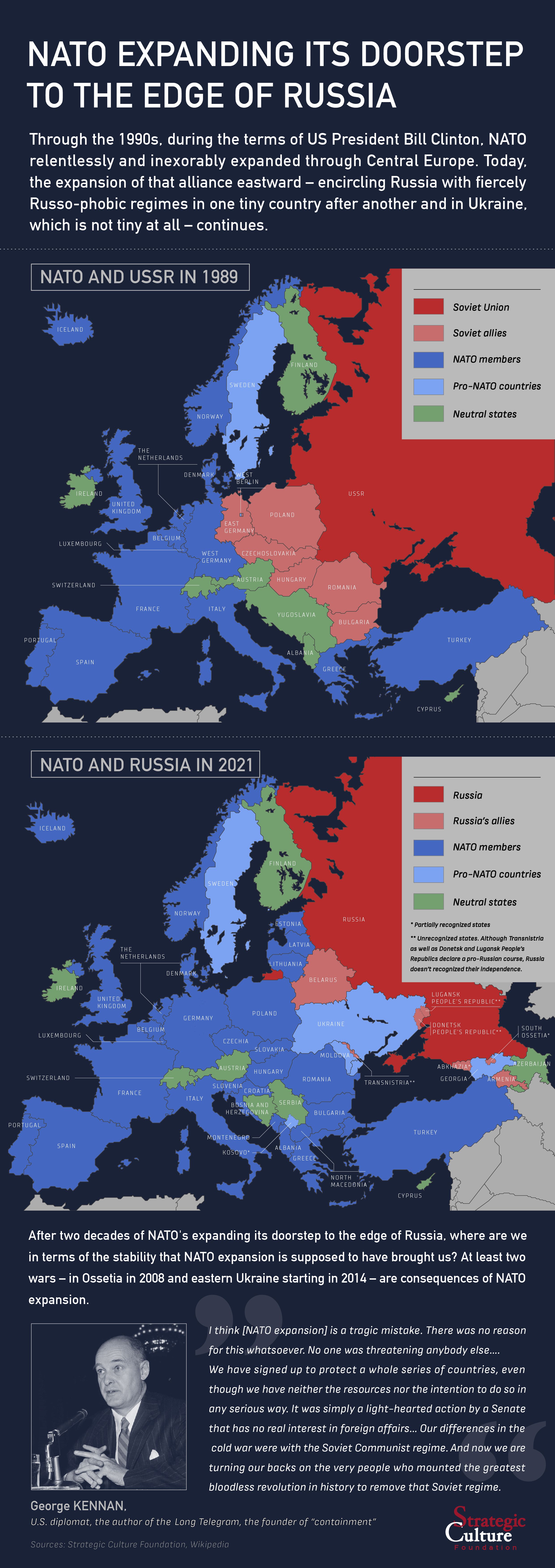Putin’s ‘Military-Technical’ Measures if Negotiations Fail
by Gilbert Doctorow
In the past couple of days, my peers in the community of Russia analysts have addressed the question of “what if” – what is it that Russia can and may do if the negotiations with the United States over its draft Treaties on security in Europe fail within the very short time period the Russians have set, apparently one month. Parenthetically, I am amused that spokesmen for the U.S. State Department say that they may enter into talks with the Russians some time in January. It seems they did not catch the short timeline the Russians have set or mistakenly believe it was a bluff.
The best of the analyses by my fellow analysts was posted yesterday by former Canadian diplomat Patrick Armstrong. I recommend this read to everyone, because it is in its own way reassuring, setting out possible Russian options that are far removed from pressing the button and blowing us all, and themselves, to bits.
However, I did not see in his piece, nor do I find in the writings of other independent analysts, not to mention on the pages of our mainstream newspapers, any explanation of what exactly Vladimir Putin meant when he said initially and repeated yesterday before the Collegium of the Russian Ministry of Defense, an audience of a hundred or more generals, that should the talks with the US fail, Russia will immediately implement “military-technical” retaliatory measures.
The term “military-technical” has been picked up and sold for the purchase price by nearly all our media. No explanation is given, because very likely no one really understands the term.
So I will have a go at it here and now, after a eureka moment came to me earlier this morning. The term is as elusive as the translation of “адекватный,” which most everyone (or every translation software) wrongly translates as “adequate” when it normally means “appropriate” or “suitable.”
The “technical” in the expression is coming from техника, which is the common Russian way of saying “equipment”. Military “tekhnika” means motorized howitzers, personnel carriers, fighter jets, etc. Tekhnika also has common civilian use: the outfitting of a factory is “tekhnika” as in “техническое оснащение.”
So, what Putin is saying is that the Russians will respond by deploying military hardware. Now what hardware would that be? Given that so much of the draft treaties deal with short-range missiles that the US is deploying in Europe and hopes to deploy in Ukraine, it is entirely logical that the Russian response to failure in negotiations will not be to invade Ukraine, it will not be to cut gas supplies to Europe, but it will be to deploy its nuclear-capable short-range missiles in Belarus and in Kaliningrad.
But that is not all. Deploying in Europe would only partially serve the Russians’ purpose. It will touch off a furious reaction in NATO, meaning a lot of hot air, but it will also precondition the Europeans to accept meekly the eventual capitulation of the United States that they would otherwise denounce as appeasement.
As I have said previously, Putin’s entire approach is that Russia is in an arm-wrestling match with one country only, the USA. He knows that the USA does not really care if Russia and the EU blow one another up: that would only enforce their global hegemony. So the iron-clad logic is that the Russians would also station their hypersonic cruise missiles just off the US shores as Putin threatened three years ago, when he spoke about Russia’s cutting edge, next-generation strategic weapons that had then and today still have no equals in the world. That is the pistol to the head that will force US negotiators to break out into a cold sweat and do what has to be done to end the madness of their NATO expansion to the East and plans to turn Ukraine into a forward missile attack post against Russia. And the Europeans will just shut up.
Moral of the story as we head into the festive season: the end of the world is not nigh.
Gilbert Doctorow is a Brussels-based political analyst. His latest book is Does Russia Have a Future? Reprinted with permission from his blog.
© Gilbert Doctorow, 2021
The views expressed herein are solely those of the author and may or may not reflect those of The Greanville Post. However, we do think they are important enough to be transmitted to a wider audience.
All image captions, pull quotes, appendices, etc. by the editors not the authors.
YOU ARE FREE TO REPRODUCE THIS ARTICLE PROVIDED YOU GIVE PROPER CREDIT TO THE GREANVILLE POST VIA A BACK LIVE LINK.
![]() This work is licensed under a Creative Commons Attribution-NonCommercial 4.0 International License
This work is licensed under a Creative Commons Attribution-NonCommercial 4.0 International License
[premium_newsticker id="211406"]
Don't forget to sign up for our FREE bulletin. Get The Greanville Post in your mailbox every few days.


